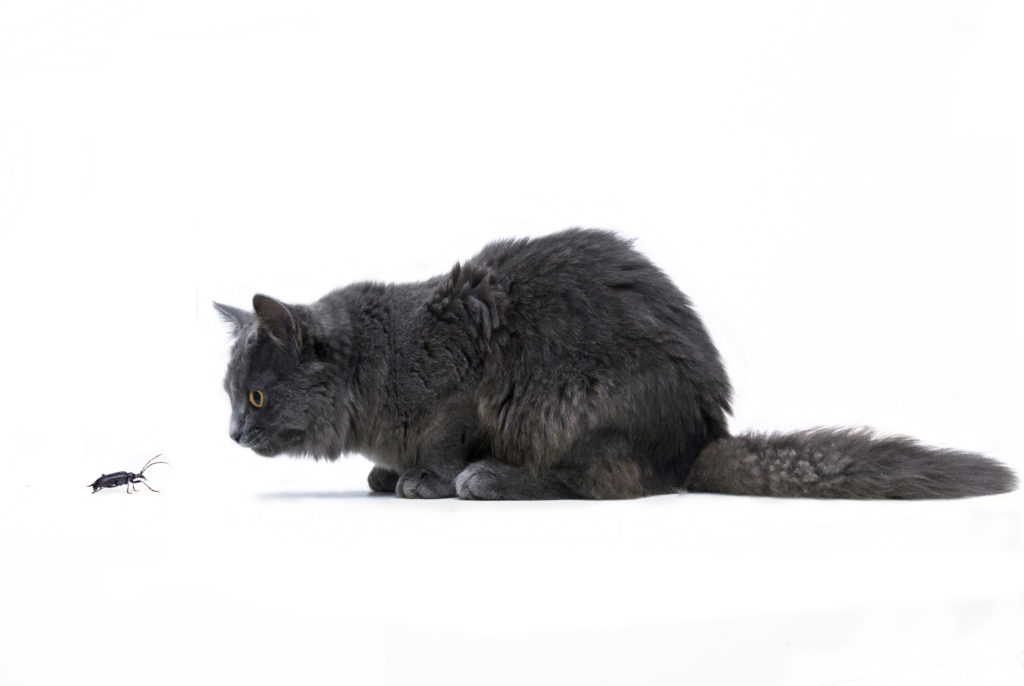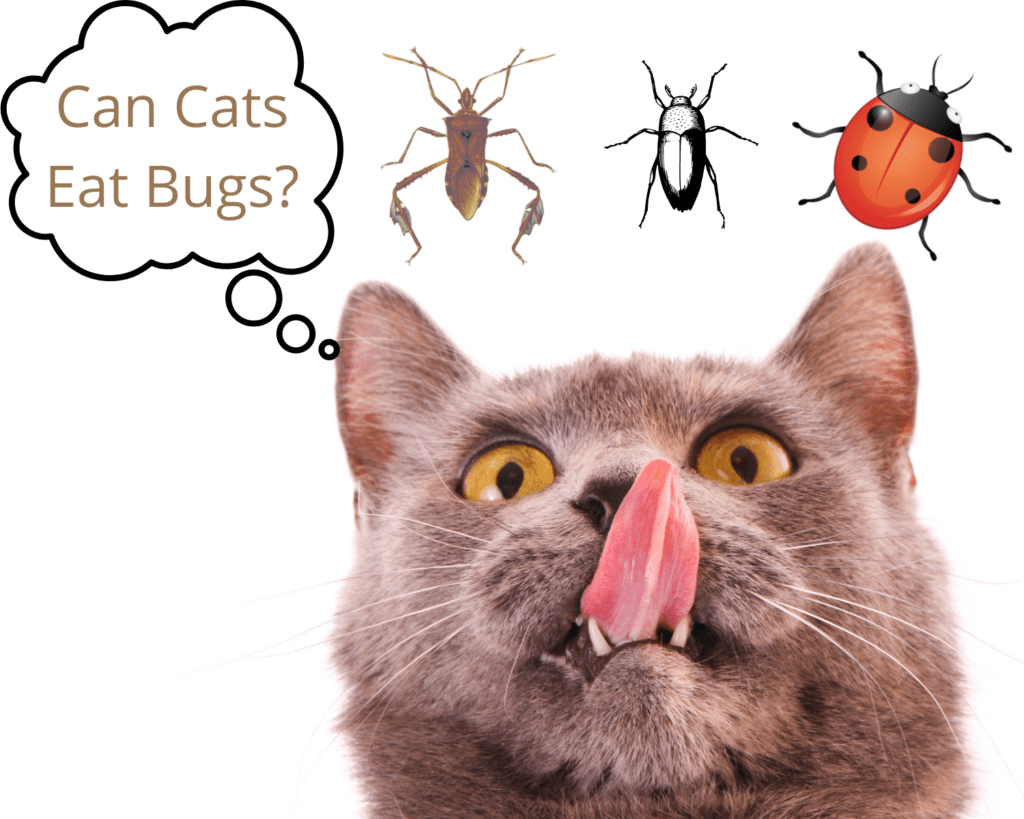Have you ever seen your cat run around and chase an insect, then try to eat it? It can seem very gross to us to see our beloved, cute pets consume bugs!
What’s the reason for this unsettling behavior? Read on to find out why your cat eats bugs.
Why Does My Cat Eat Bugs?
Mostly, cats eat bugs as a part of their predatory instincts. They may also do it out of boredom, curiosity, or for the sake of play.
4 Top Reasons Why Cats Eat Bugs
1. It’s Part Of Their Predatory Instincts
Cats are obligate carnivores. When left to fend for themselves, they hunt and kill prey to consume.
Those instincts don’t change just because they’re in a domestic setting. They still very much have the drive to hunt things down.
This is especially true because of the way that insects move. They tend to move quickly and in obvious ways that are naturally enticing to a cat’s desire to pounce.
When an insect flies or runs quickly, it can trigger a cat’s prey drive, too.
2. They’re Curious
Insects are interesting creatures to cats. They might be colorful, might move in odd ways, or might just be unusual enough to catch a cat’s attention.
This natural curiosity makes a cat want to chase bugs, and if it’s curious enough about the taste, it will then sniff and eat captured bugs.
3. They’re Supplementing Their Diets
Insects contain a decent amount of protein. While it’s not nearly enough for a cat to live off of, it can be a way to supplement its diet to make up for lost nutrients.
A hungry cat may also resort to eating bugs to fill its stomach.
Of course, even cats that are well-fed and nutritionally satisfied may still want to eat bugs just because they like to eat. If your cat is highly food-motivated, chances are that it simply sees a source of food and wants to consume it!
4. For Entertainment
Cats love chasing things and pouncing on them. That’s why so many cat toys relate to engaging those desires.
A bored or otherwise unoccupied cat might decide to chase a passing bug for fun.
Killing and eating the insect is sort of an afterthought in those cases – just a natural follow-up to the fun. It’s a form of play to a cat, as morbid as that seems to be!
Are Bugs Safe For My Cat To Eat?
Lots of bugs are safe for cats to eat. A little extra protein and a bit of mental and physical exercise can even be beneficial for cats this way. Most of the time, this is perfectly fine.
But, at the same time, not all bugs are safe for consumption.
Venomous and poisonous insects and arachnids are especially notable here. If these bugs are dangerous to humans, they’re even more dangerous to cats due to their smaller size.
Some common bugs (and creepy-crawlies) that may have these properties are moths, spiders, scorpions, and centipedes.

Hard-bodied bugs are another no-no. These bugs boast hard exoskeletons that your cat’s stomach is not equipped to digest.
This can irritate your cat’s digestive system and cause numerous problems. Some common bugs that have this property are cockroaches, grasshoppers, crickets, and beetles.
You should also consider some of the following complications that make the question of safety a little muddy:
- Bugs with stings can cause swelling, allergic reactions, and infections, as well as general injury.
- Some bugs can bite quite fiercely and can hurt your cat, causing swelling, infections, and other injuries. Other bug bites may have venom and other dangerous compositions that can harm a cat. Fire ants and some spiders are especially harmful.
- Bugs that are infected with insecticide or other poisons, when consumed, may accidentally poison your cat. The amount is usually not enough to cause harm to a cat, but it’s worth noting this possibility.
- Some bugs might carry diseases or parasites that can be passed onto your cat when it eats them. The risk is very small but worth keeping in mind. Ticks, fleas, and flies are notable insects that meet this description. Mosquitos also can carry a heartworm disease that, if infection holds on a cat, can be fatal.
In other words, you should consider not just the consumption of the insect, but the way it may choose to defend itself against a cat.
Should I Stop My Cat From Eating Bugs?
You should stop your cat from eating dangerous or harmful bugs. But, aside from that, eating insects is natural to a cat and isn’t a behavior that you necessarily need to train away.
With that being said, you may opt to stop your cat from eating bugs if you don’t want them to continue the habit due to a high volume of dangerous insects in the environment.
Some cats may also have bad stomach reactions to eating bugs, in which case you may want to steer your cat away from eating them.
How To Stop My Cat From Eating Bugs?
1. Invest In Better Anti-Bug Measures
The fact is that the easiest way to stop your cat from eating bugs is to reduce the chance that your cat will encounter any bugs at all.
This is because a cat’s natural chase drive is hard to train away, and also because it’s very tough to keep an eye on your cat’s actions every minute to ensure they haven’t found a bug!
You may want to purchase bug screens and take action to get rid of any bug infestations as soon as you notice them. (Just remember to be cautious about insecticides that are dangerous to pets!)
Keeping your cat indoors as much as possible is also a good idea, so you know for certain that they aren’t going out and eating random insects.
2. Take Bugs Away Once They’re Dead
Not all cats who chase bugs eat them. Many of them may run after bugs, swat at them, and play with them a little before deciding to eat them.
Keep an eye on your cat and remove any bugs as soon as they’re dead so your cat isn’t able to eat them.
Do note that this may have the unintended side effect of your cat deciding to try to “hide” insects to eat later. But if your cat is getting fed well and has plenty of treats and nutritious foods, it’s unlikely that it will perform this behavior.
3. Redirect Your Cat When It Notices Bugs
Redirecting a cat from bugs can be tricky, especially if you’ve never gone through any kind of training with it before.
The easiest way is by bringing out a simple snack or a loved toy whenever your cat gets interested in a bug, thus redirecting its attention to the preferred item.
However, this may not be sufficient with particularly determined cats. If you’ve trained your cat to respond to its name and a few basic commands, this will be the right time to use those tricks!
When your cat notices an insect, redirect it by saying its name and issuing a command, then praise and reward your cat for ignoring the bug.
It’s worth noting that training cats can be quite difficult, so if you haven’t already trained your cat, be ready for an uphill battle when trying to redirect its attention!
Conclusion
It’s natural for cats to want to chase and eat bugs, and in many cases, this is completely fine. However, you should be aware of the kinds of bugs that will be dangerous to your cat.
If you notice any negative reaction after your cat has consumed an insect, you should bring it to the vet quickly.

